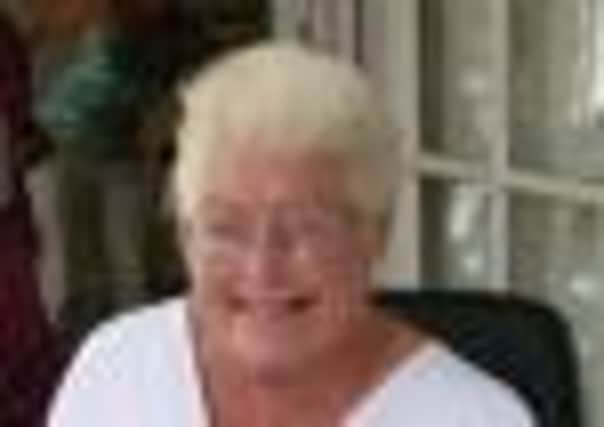Obituary: Angela Booth, nurse, disability campaigner and author


Angela’s was a full life, a triumph of the human spirit over physical adversity. She was a lady who through force of circumstance became increasingly dependent on the help of others, but who gave back to her family, friends and a wider community much more than they could ever repay.
Born of an Australian mother and a Scottish father, Angela and her brother Alexander spent most of the war years in Australia with their mother, while their father served in the Royal Navy. When the war ended they returned to Scotland where two sisters, Mary and Susan, were added to the family.
Advertisement
Hide AdAdvertisement
Hide AdAngela trained at the Middlesex Hospital in London, was selected to be a ward sister and became engaged to her future partner and husband, John Dobbie. She was then diagnosed as having multiple sclerosis, which turned out to be neurological sarcoidosis, a form of inflammation which could attack virtually any part of the body.
The illness is progressive, forcing her to depend, in turn, on a walking stick, then a zimmer and, finally, a wheelchair. Angela could not continue her nursing career but John was determined they should be married, as they were at St Cuthbert’s Parish Church, Edinburgh on 12 January, 1963.
They well understood the formidable obstacles their love would encounter but it proved more than equal to the severest tests. Their crowning glory was their two daughters, Clare and Lisa, who were raised by them in a close, loving but outward looking family.
It is from this time that the wheelchair, first suggested by one of her sisters, turned out to be a liberating influence on Angela’s life.
She took up activities which would be forbidden by the stifling control of present day health and safety authorities but were an irresistible challenge to an intrepid Angela – trimaran solos on the Firth of Forth, paragliding in Cyprus, safaris in South Africa, cable cars on Table Mountain and in the Swiss Alps, and travel back and forth to Australia and any other destination where time and money allowed. As Angela put it: “Now my wheelchair is always on fast setting. I like to feel the wind in my face.”
But while Angela could be the life and soul of any gathering or party, she was by nature and upbringing a serious lady, determined to use her skills and life experience to help others, particularly those who, like her, found their enjoyment of life inhibited by disability and poor access to a wide range of social and cultural activities.
She became a member of the Scottish Access Committee and the Access Panel for Edinburgh, both aimed at improving access to public buildings for people with every kind of disability.
She knew how to reach a wider audience, on one occasion setting out with two Radio Forth reporters and a gaggle of councillors to research and defeat the difficulties of accessing cinemas, theatres and shops. Subsequently she became the founding chairman of Artlink, a charitable organisation established to help elderly, disabled people to take part in all arts activities, whether as visitors or as active participants. She was also a board member of the Royal Infirmary Trust.
Advertisement
Hide AdAdvertisement
Hide AdShe became an author too. Her disabled hands made it impossible for her to type but, as always, she came up with a solution. She dictated her text to a cassette recorder and thus came her autobiography, Both Sides of the Fence.
She understood a fence could take many forms – the distance between her beloved Scotland and Australia, the physical barriers which could impede disabled people from taking a full part in the life of a wider society and the need to have a special regard for their needs.
As Angela put it: “I believe strongly that it is up to us who are disabled to explain in a pleasant way, not to be confrontational, but to help others understand our various difficult situations.”
Angela was a born leader and energiser. She understood the need to reward those who made an effort to help others. Her “gold stars” were highly prized but it has to be said that the most glittering prizes appeared to be rewarded to “John and the two girls”.
Angela is survived by John, Clare and Lisa, by her remarkable mother Ida Wilkie, who will celebrate her 100th birthday later this year, by her brother and two sisters, and by numerous Wilkies and Booths in Scotland and Australia.
A host of friends and other families, individually and collectively, will remember her unfailing courage, determination and her serious purpose.
She was, indeed, a “lady with the lamp”.
But the last words must lie with her daughters who, at her memorial service at St Cuthbert’s Parish Church where Angela and John were married, put it this way: “We know you will be smiling down on us today and we will remember you always as the wonderful lady with the beautiful smile.”
SIR DONALD MACKAY